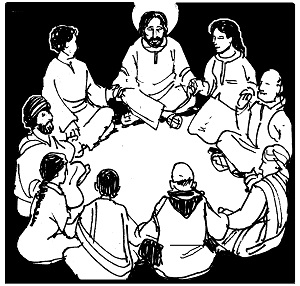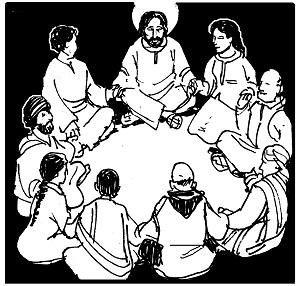

“Does this shock you?” (John 6:61).
Jos 24:1-2a, 15-17, 18b; Ps 34: Eph 5:21-32; John 6:60-69
Twenty-first Sunday in Ordinary Time
The Lectionary joins three readings for today’s liturgy that explore the theme of submission. Joshua challenges the Israelites to be loyal to Yahweh over the false gods of the people in whose country they are entering. His stirring words, “As for me and my household, we will serve the LORD,” have lived on as a call to remain faithful to God in the face of the allure of popular culture and alternative beliefs and values.
In today’s Gospel the disciples of Jesus were likewise tempted to turn away from him over his difficult teaching on the Bread of Life as his very flesh and blood (6:52-58). Many could not accept this, and Jesus asked the Twelve if they were going away, to which Peter famously replied, “Master, to whom shall we go? You have the words of eternal life.”
The third example of submission is from Ephesians, in which wives are told to be submissive to their husbands, based on the Creation story in Genesis and in imitation of the church’s subordination to Christ. Preachers get two options for this difficult reading, one with more emphasis on mutual submission and love, but still under male headship. Why this reading was matched to the others is less evident, but its thematic importance grows if we relate the unity in love in the eucharist with the marriage bond.
While some evangelical churches still accept wifely submission as biblically inerrant, most mainline churches have moved on to marriage equality as both norm and ideal, but they still must deal with exclusive language and a male-heavy theology of God as Father, Son and Holy Ghost. And for Catholics, an all-male priesthood ensures that only men will be in the pulpit to explain this.
For those tempted to walk away, all three scripture readings still challenge believers to deepen their allegiance to God and Jesus’ offer of his flesh and blood as the key to eternal life. His disciples were shocked at the idea of flesh and blood union with Jesus, though this is the very purpose of the Incarnation and is the goal of both Baptism and Eucharist. Baptism incorporates us into the body of Christ. Eucharist transforms us into what we consume. We are members of the crucified and risen body of Jesus in the world.
The mystery deepens when we recall the other time Jesus’ disciples were shocked by his teaching, this time on marriage (Matt 19:3-12). The bond between husband and wife is indissoluble because “the two become one flesh.” This teaching was so hard the disciples concluded it was better not to marry. Yet, sacramental intimacy with Jesus through Baptism and Eucharist reaches its most intimate form at Mass because every Mass is a nuptial celebration of the one bond so deep that to neglect it is fatal. If we do not have this love relationship with Jesus, we do not have eternal life.
If this does not shock us, we do not yet understand what writer Annie Dillard meant when she wrote that crash helmets and seatbelts should be required at every Mass.
Advertisement






